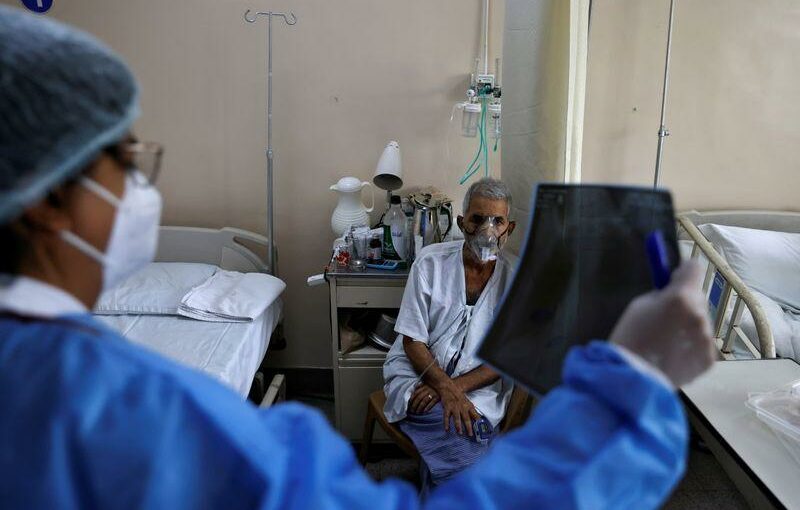NEW DELHI (Reuters) – India’s rampant second wave of COVID-19 topped 400,000 new daily cases for the first time on Saturday, as the country opened up its massive vaccination drive to all adults, although several states warned of acute shortages.
Authorities reported 401,993 new cases in the previous 24 hours, the highest daily count globally, after 10 consecutive days over 300,000. Deaths from COVID-19 jumped by 3,523, taking the total toll in India to 211,853, according to federal health ministry data.
The world’s biggest producer of COVID-19 vaccines has a limited number of shots available, worsening a surge in infections that has overwhelmed hospitals and morgues while families scramble for scarce medicines and oxygen.
India’s West Bengal state was unable to start a vaccination drive for adults aged between 18 and 45 on Saturday due to shortage of shots and urged the federal government to provide more supplies, a senior state health official said, declining to be named as he was not authorised to speak with media.
The chief minister of the hard-hit state of Delhi on Friday implored people not to queue at vaccination centres, promising more vaccines would arrive “tomorrow or the day after”.
India’s eastern Odisha state said on Friday it had received a consignment of 150,000 shots but would only allow a few people to get shots due to lockdown restrictions preventing movement.
In Ahmedabad, the main commercial city in Prime Minister Narendra Modi’s home state of Gujarat, hundreds of people were seen queuing.
“I took my first dose and I am appealing to all students to take the vaccine and be safe,” said Raj Shah, a 27-year-old student in Ahmedabad.
DELHI STILL GASPING
Desperate COVID patients, meanwhile, continued to arrive at hospitals on Saturday despite a shortage of beds.
Gasping for air, 62-year-old Vijay Gupta was turned away by Holy Family hospital, a non-profit private facility in the south east of India’s capital as all of its 385 beds being full.
Waiting outside the hospital his family and friends debated what to do try next.
“We have been roaming around since 6 a.m. looking for a bed,” said Gupta’s friend Rajkumar Khandelwal. “Where shall we go?”
A fire in a hospital about 190 km (115 miles) south of Ahmedabad killed 16 coronavirus patients and two staff, the latest in a series of deadly accidents at hospitals.
Modi offered his condolences to the families of the victims on Twitter, hours after he posted pictures of himself praying at a Sikh temple in capital New Delhi.
WARNING SIGNS IGNORED
Some experts blame mass religious gatherings and political rallies for the severity of India’s second wave, which caught the government unprepared.
Daily infections have soared since the start of April, easily topping the previous global record of 297,430 one day in January in the United States, where infection rates have since fallen sharply.
A forum of scientific advisers set up by the Modi administration warned Indian officials in early March of a new and more contagious variant of the coronavirus taking hold in the country, five scientists who are part of the forum told Reuters.
Despite the warning, four of the scientists said the federal government did not seek to impose major restrictions to contain the spread of the virus. Millions, largely unmasked, attended religious gatherings and election rallies that were held by Modi, leaders of the ruling Bharatiya Janata Party and opposition politicians.
The total number of COVID cases in India has topped 19 million. As the second wave has picked up steam, India has added about 7.7 million cases since the end of February, according to a Reuters tally. In contrast, it took India nearly six months to add the previous 7.7 million cases.
India could resort to a temporary shutdown and needs to get more people vaccinated to contain the virus, Anthony Fauci, the United States’ top infectious disease doctor and medical advisor to the White House, told the Indian Express newspaper in an interview.
The surge in cases led U.S. President Joe Biden to impose new travel restrictions on India on Friday, barring most non-U.S. citizens from entering the United States.
Australian officials said residents and citizens who have been in India within 14 days of the date they plan to return home will be banned from entering Australia as of Monday, and those who disobey will face fines and jail.
Other countries and territories have also imposed travel restrictions on India, including Britain, Germany, Italy and Singapore, while Canada, Hong Kong and New Zealand have suspended all commercial travel with India.
Source: Read Full Article
